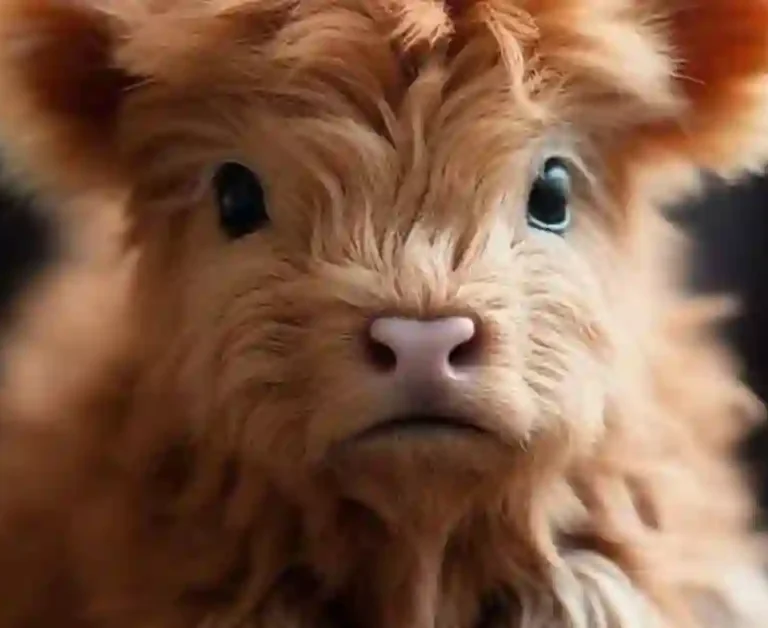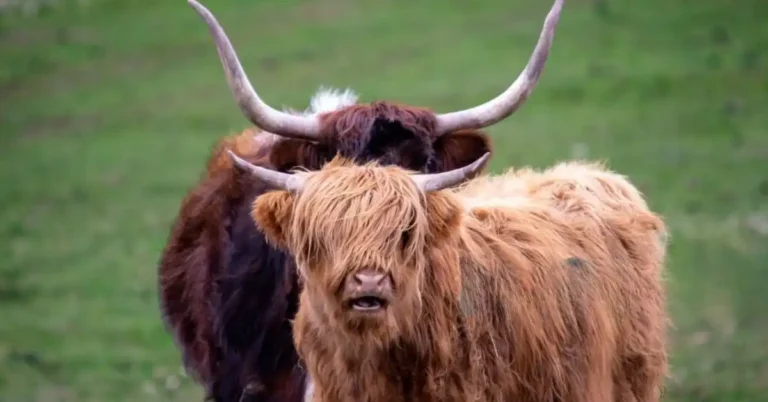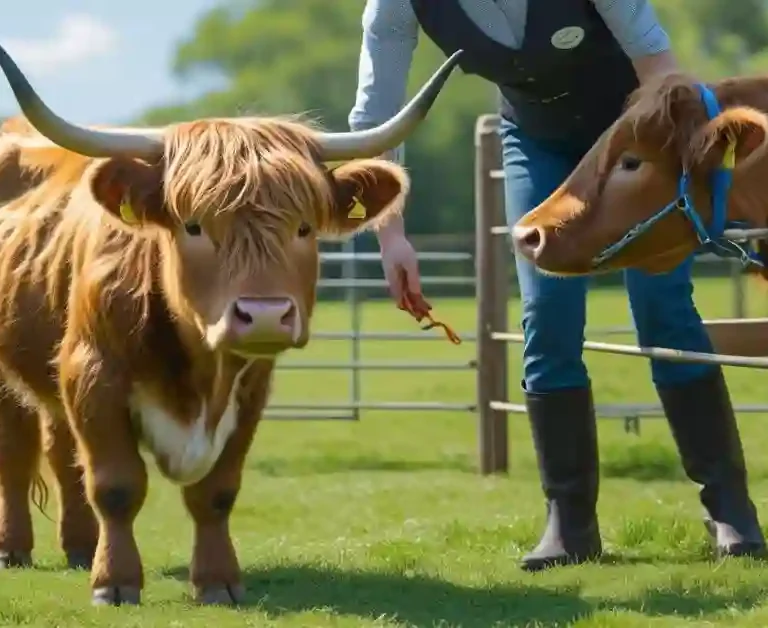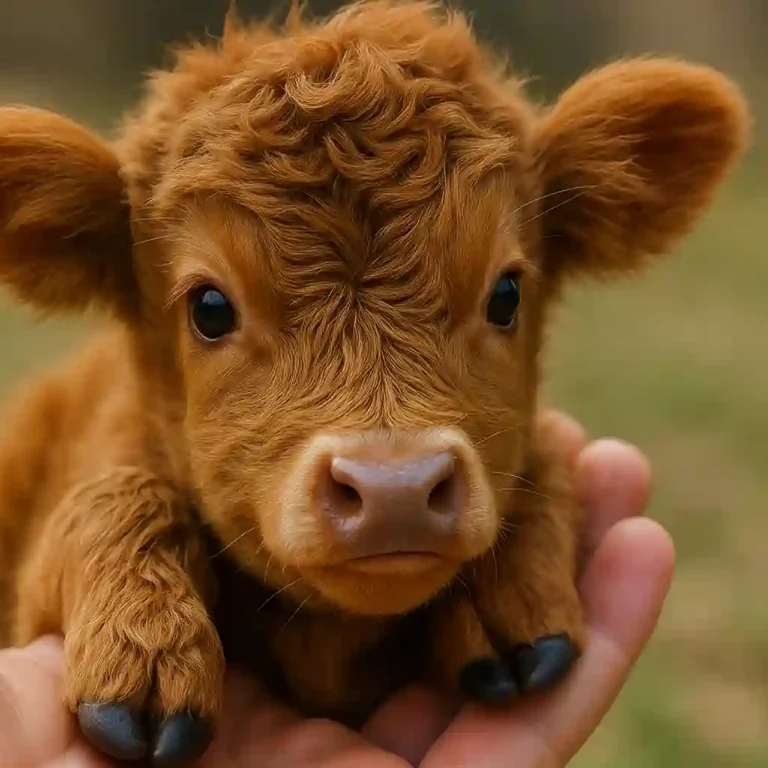Miniature Highland Cow Guide: Cost, Care & Facts Before You Buy
Welcome to your complete guide to the adorable world of miniature highland cow. If you’re considering adding these charming miniature cattle, specifically micro highland, to your small farm or simply curious about them, this comprehensive guide will provide you with the information you need.

We’ll explore what makes a mini highland cow unique, from their shaggy coat to their manageable size, and help you determine if owning mini highland cows is right for you.
Introduction to Highland Cows
What is a Miniature Highland Cow?
A miniature highland cow is essentially a smaller version of the standard highland cattle. These miniature breeds retain all the characteristics that make the traditional highland cattle so beloved, including their distinctive long horns and that iconic shaggy coat, but in a more compact size.
The result is a delightful, smaller animal that’s easier to manage, especially for those with limited space. These mini cattle still possess the hardy constitution of their larger relatives, making them well-suited to various climates, but their size makes veterinary care and handling somewhat simpler.
Overview of miniature Highland Cattle Breed
The highland cattle breed is known for its resilience and adaptability, traits honed over centuries in the rugged Scottish highlands. Standard highland cows are a hardy breed, capable of thriving in harsh conditions where even smaller than regular highland breeds might struggle. Their distinctive shaggy coat provides excellent insulation against cold and wet weather.
The miniaturehighland cow is known for its gentle temperament and this makes it a popular choice for both experienced farmers and those new to livestock. These cows, especially the mini versions of the traditional highland, are known for their longevity, with a longer lifespan than many other cattle breeds.
History of Highland Cattle
The history of highland cattle is deeply intertwined with the Scottish highlands. For centuries, these hardy animals grazed the rugged terrain, providing sustenance and playing a vital role in the highland way of life. The breed’s evolution reflects its adaptation to the challenging environment, resulting in its distinctive features, such as the thick, shaggy coat and strong constitution.
Today, both regular highland cattle and their miniature counterparts, like the mini highland cow, are valued for their beauty, hardiness, and adaptability makes them an excellent choice for small farms looking for mini cows. Registered highland cattle are a testament to the breed’s rich heritage and continued popularity.
Characteristics of Miniature Highland Cows

Physical Traits and Size
The physical traits of the miniature highland cow, even smaller than regular highland cattle, are arguably what make them so endearing. The most notable feature of the Scottish highland cattle is their unique appearance. shaggy coat, providing excellent insulation and contributing to their charming appearance.
The iconic horns of highland bulls, while present, are often smaller and more proportionate to their smaller size than those of standard highland cattle. As miniature breeds, their compact size is a key characteristic. Typically, miniature highland cattle stand significantly shorter than their standard counterparts, making them easier to handle and manage on a small farm.
The cows may come in various colors, from black and red to yellow and dun, adding to their visual appeal. These physical attributes make the mini highlands a delightful addition to any petting zoo or small farm.
Temperament and Behavior
Beyond their physical appearance, the temperament of the mini highland cow is a significant draw for many owners. They are generally known for their The docile and gentle nature of the well-bred highland makes them ideal companions., making them easy to handle and interact with.
This gentle temperament makes them a popular choice for families and those new to owning miniature highland cows. The miniature highland cattle are often curious and enjoy human interaction, further enhancing their appeal.
While they are herd animals and thrive in the company of other cows, they adapt well to smaller groups and can even bond with other types of animals. The cows are known to be calm, which helps ensure they can be managed with ease.
Health and Lifespan of Miniature Highland Cow
The health and lifespan of the miniature highland cow are important considerations for prospective owners. Like standard highland cattle, mini highland cattle are generally hardy and resilient. Proper care is essential to ensure the well-being of your mini cow, including providing adequate nutrition, shelter, and regular veterinary care.
While their lifespan can vary, they typically live for 15 to 20 years, offering many years of companionship and enjoyment. Regular health check-ups are crucial for detecting and addressing any potential health issues early on. Because of their small size, some veterinary care for a mini highland cow may be easier compared to larger cattle breeds.
Potential owners should research breed-specific health concerns related to mini-highland cows to ensure they can provide the best possible care for their miniature highland cow or miniature highland calf.
Owning Mini Highland Cows
Space and Environment Requirements
When considering owning mini highland cows, it’s important to assess your space and environment. Although smaller in stature, the mini highland cow still requires adequate room to roam and graze, similar to other miniature cattle breeds. A smaller pasture is sufficient, but overgrazing should be avoided to maintain healthy vegetation.
The hardy nature of highland cattle allows them to adapt to various climates, but they still need access to shelter, especially during extreme weather conditions. Proper fencing is essential to contain your miniature highland cattle and protect them from predators. The miniature breeds will be happy on a well maintained small farm.
Feeding and Nutrition for Miniature Highland Cows
Providing proper care through balanced feeding and nutrition is vital for the health and well-being of your mini highland cow. The mini highland cattle, like their larger counterparts from the highland breed, are primarily grazers, so access to quality pasture is essential.
Supplementing their diet with hay, especially during winter months or when pasture is limited, ensures they receive adequate fiber. The miniature breeds should be monitored for weight and body condition to prevent obesity or malnutrition. Fresh water should always be available to maintain their health and ensure proper hydration. Providing a balanced diet is part of proper care for a mini highland calf.
Care and Maintenance of miniature Highland Calves
Caring for highland calves requires specific attention to ensure their healthy growth and development. A highland calf needs proper nutrition, including colostrum from their mother shortly after birth, to provide essential antibodies. Regular veterinary care, including vaccinations and deworming, is crucial to protect against common diseases.

Providing a clean and safe environment for the highland calf minimizes the risk of infections and injuries. Monitoring their weight gain and overall health is important to identify any potential problems early on. Ensure the highland calf is properly socialized to avoid any temperament issues as it grows.
Benefits of Keeping Miniature Highland Cows
Companionship and Family Pets
One of the most rewarding benefits of owning miniature highland cows is the companionship they offer. The gentle temperament of the miniature highland cattle makes them excellent family pets, especially for those seeking a unique and manageable livestock option.

Their docile nature and charming appearance make them a delightful addition to any small farm or petting zoo, particularly when considering miniature cows. Many owners enjoy interacting with their miniature cattle, finding them to be curious and affectionate. The cows are known to bond with their owners, creating a special connection. Because of their smaller size, they are easier to handle.
Land Management and Grazing Benefits
Beyond companionship, the mini highland cow offers significant land management and grazing benefits. Their grazing habits help control vegetation and prevent overgrowth, contributing to a healthy ecosystem. The mini highland cattle are efficient grazers, consuming a wide variety of plants and reducing the need for mowing or other manual vegetation control methods.
Their compact size minimizes soil compaction compared to larger cattle breeds. This makes them an environmentally friendly choice for managing small farms or acreage. The manure from the cows is known to be a natural fertilizer for the field.
Unique Aesthetic Appeal
The unique aesthetic appeal of the mini highland cow is undeniable. Their shaggy coat, iconic horns, and compact size make them visually striking animals that add character and charm to any landscape. The miniature breeds come in various colors, from red and black to yellow and dun, enhancing their visual diversity.
Many people appreciate the beauty and tranquility that these miniature cattle bring to their property. The cows may serve as a unique attraction for visitors. Owning mini highland cows for sale will bring aesthetic value to the farm, giving it a great first impression.
Challenges of Owning Miniature Highland Cows
Common Health Issues in Miniature Highland Cows
Like all livestock, miniature highland cattle can be susceptible to certain health issues. Owners should be aware of potential problems such as parasites, respiratory infections, and foot rot. Regular veterinary care and preventative measures are crucial for maintaining the health of the mini highland cow. Because of their shaggy coat, they may be prone to external parasites if not properly managed.
Some miniature breeds may have a predisposition to certain genetic conditions. Prompt veterinary attention is important if any signs of illness are observed. Responsible breeders of micro highland prioritize the health and well-being of their cows and screen for potential health problems. Providing proper care for your mini highland calf is the best way to ensure a long and healthy lifespan for your well-bred highland.
Cost Considerations for Care and Maintenance
Prospective owners should carefully consider the cost implications of owning miniature highland cows. The initial purchase price of miniature highland cows can vary depending on the breed, pedigree, and age. Ongoing expenses include feed, veterinary care, fencing, and shelter.

Proper care and regular hoof trimming are essential for maintaining their health. Emergency veterinary care for highland breed cattle can be expensive, so it’s wise to have a financial plan in place. While the smaller size may reduce some costs compared to standard highland cattle, responsible ownership still requires a financial commitment.
Purchasing registered highland cattle, including versions of the traditional highland, may also come with costs. Budgeting for these expenses ensures you can provide for the long-term well-being of your mini highland cow.
Legal and Zoning Regulations
Before acquiring mini highlands, it’s essential to research and comply with all applicable legal and zoning regulations. Many areas have restrictions on owning livestock, including minimum acreage requirements and fencing regulations. Check with your local authorities to ensure that owning miniature highland cows is permitted in your area.
Some regions may have specific rules regarding waste management and animal welfare. Failure to comply with these regulations can result in fines or other legal consequences. Responsible ownership includes respecting the laws and regulations in your community. Confirming this ensures a smooth and hassle-free experience when owning miniature cattle breeds like mini highland cows.
Are Miniature Highland Cows Right for You?
Assessing Your Lifestyle and Resources
Deciding whether owning mini highland cows or other miniature cattle breeds is right for you requires careful self-assessment. Consider your lifestyle, available time, and financial resources. Owning highland cattle is a long-term commitment that demands dedication and attention.
Assess your ability to provide proper care, including feeding, shelter, and veterinary care. Evaluate your property to ensure it meets the space and environmental requirements of miniature highland cattle. If you’re new to livestock ownership, consider gaining experience or seeking guidance from experienced owners. Be realistic about the demands of caring for these miniature breeds and ensure they align with your capabilities.
Your Commitment to Miniature Highland Care
Owning a mini highland calf demands a high level of care, similar to that required for standard highland cows. commitment to their well-being. This commitment extends beyond providing basic needs such as food and shelter. Social interaction and enrichment are crucial for the mental and emotional health of adult highland cows.
Regular health monitoring and preventative veterinary care are essential to ensure a long and healthy lifespan for your mini cow. Be prepared to invest time and effort in understanding the specific needs and behaviors of your mini-highland cows.
Attending educational workshops or consulting with experienced breeders can enhance your knowledge and skills in caring for your miniature cattle. Your dedication to proper care directly impacts the quality of life for your miniature highland cow.
Conclusion:
The miniature highland cow is undeniably charming and rewarding animals to own, but it’s crucial to approach ownership with realistic expectations and a commitment to responsible care. The cows are known for their gentle temperament and unique aesthetic appeal, making them a delightful addition to any small farm.
Owning regular highland cattle can bring a great experience. Ensure that you have the resources, space, and dedication to meet their needs. By carefully considering all aspects of ownership, you can enjoy the companionship and benefits of these purebred highland breeds. Registered highland cattle require extra care and documentation to keep their pureness.




